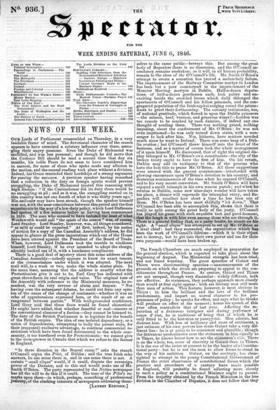"Is there disunion in the Repeal camp ?" asks the
stanch O'Connell organ the Pilot, of Dublin ; and the true Irish echo answers, In one sense there is, and in one sense there is not. A certain "small clique" would, if it could, dispute the sovereign power of the Dictator, and to this end would make use of Mr. Smith O'Brien. The party represented by the Nation newspaper has all the will to do this if it could. The tone of the Pilot's re- marks upon them—in which, perhaps, something of professional jealousy, of the clashing interests of newspapers addressing them- selves to the same public—betrays this. But among the great body of Repealers there is no dissension, and the O'Connell 03- cendancy remains unshaken; as it will, in all human probability, remain to the close of the O'Connell's life. Mr. Smith O'Brien's attempt to create a sensation has proved a melancholy failure. The imprisonment of the Railway Committee martyr in London has been but a poor counterpart to the imprisonment of the Monster Meeting martyrs in Dublin. Half-a-dozen depute, tions, of half-a-dozen gentlemen each, look paltry and un- exciting beside the crowded levees which daily thronged the apartments of O'Connell and his fellow prisoners, and the con- gregated population of the Irish capital surging round the prison- doors to greet their forthcoming. The savoury testimonies, too, of national gratitude, which flowed in upon the Dublin prisoners —the salmon, beef, venison, and generous wines !—London was too remote to be reached by such dainties, if indeed any one thought of sending them. There was nothing grand, nothing imposing, about the confinement of' Mr. O'Brien : he was not even imprisoned—he was only turned down stairs, with a mes- senger to look after him. Nor, hitherto, have matters mended much since he went to Ireland. There was some brag of a Dub- lin ovation ; but O'Connell threw himself into the heart of die business, and as a matter of course took the whole management of it upon himself. He discovered, that of right the original dis- play belonged to Mr. O'Brien's own constituents—the city of the broken treaty ought to have the first of him. On his return,. Dublin may add its testimony- to that of the persons who have the best title to praise Mr. O'Brien. All these suggestions were uttered with the gravest countenance—interlarded with glowing encomiums upon O'Brien's devotion to his country, and dexterowireminiscences of the time when he opposed O'Connell, and to his very recent conversion. Mr. Smith O'Brien will have enjoyed a small triumph in his own remote parish; and when-he returns to Dublin, some new nine-days wonder will have taken his place, a dinner will supersede the triumphal entry, and Re- peelers will recollect how short a time he has been one of them. Mr. O'Brien has been most skilfully "lit down." That O'Connell has been able to accomplish this, shows that there is really no split among the great body of the party. O'Connell has played his game with such exquisite tact and good-humour, that the laugh is with him even among those who see through it. There is a general feeling that, as a party leader, he stands on his right. A small clique" ha's attempted to set up Mr. O'Brien as a rival chief : had they succeeded, the organization which has been the work of O'Connell's 4ifetime—which it is their object not to destroy, but to get into their own power and use for their own purposes—would have been broken up.


















































